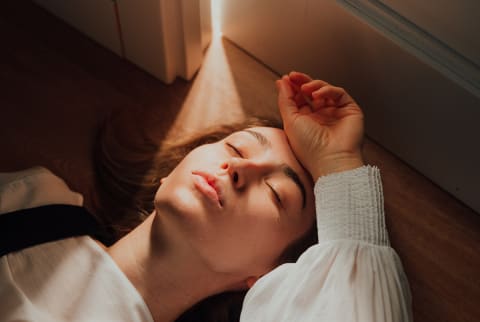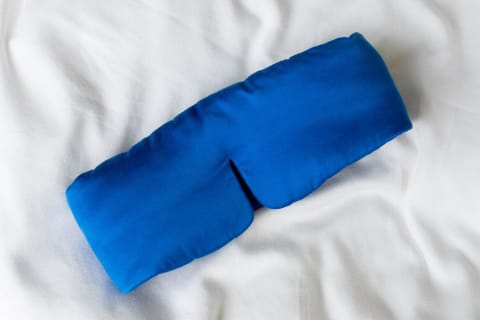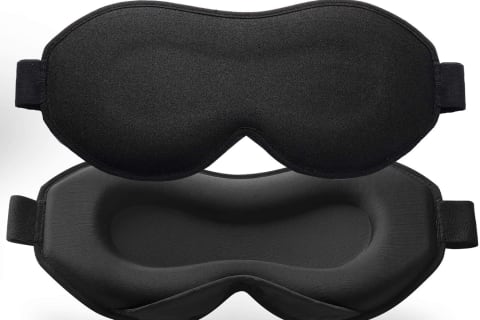Advertisement
6 Ways To Make Your Bedroom Darker — Without Shelling Out For Blackout Shades


In order to conserve energy, our bodies run on rhythms: Our blood pressure, heart rate, body temperature, etc., all ebb and flow as the day goes on. The light-dark cycle of nature keeps these rhythms humming along smoothly, with darkness sending the signal that it's time to wind down for rest. That's why pitch-black bedrooms are ideal for deep and restorative sleep.
Blackout curtains are really effective at keeping light out of your sleep space, but higher-end ones can be pricey. Here are some other, more affordable ways to tell your body it's lights out:
Use an eye mask.
Sometimes, the simpler the better. "Eye masks are cheap, easy, and they work," Michael Grandner, Ph.D., director of the Sleep and Health Research Program at the University of Arizona, tells mbg of the low-tech sleep solution. "Most people say they'll never get used to them and then they wear them for a week and they're fine."
Functional medicine doctor Frank Lipman, M.D., also sang eye masks' praises on a recent episode of the mindbodygreen podcast, calling them a great tool to keep on your nightstand or throw in your suitcase when you travel to support deeper sleep.
2. Recruit a plant.
For those looking for a darkening solution that's pretty and practical, interior designer and author of Where Spirit Meets Space Kelly Robinson recommends going the natural route and using "a big fiddle leaf fig (Ficus lyrata) tree or two to block the sun from your window."
The ficus Audrey (Ficus benghalensis) and money tree (Pachira aquatica) are two more relatively low-maintenance houseplants that can nestle your room in shade.
Keep your phone out of the bedroom (no, really this time).
Not all light is created equal, and our bodies have evolved to register certain frequencies and colors of light as more energizing.
"When our eyes see light in the teal to green to blue spectrum, it's daytime. It's the color of sunlight through seawater... It's the color of the natural world," Grandner explains. It's also, unfortunately, the color of our phone screens.
Even if the rest of your sleep environment is pitch-black, looking at your phone in bed can still send a signal to your body that it's earlier in the day than it actually is.
"Even though the amount of light coming out of them isn't huge, it's all going right into our eyes," Grandner says as to why phones, in particular, are so harmful to sleep compared to electronics like TVs that tend to be farther from our faces. "It could be sending a daytime signal at the wrong time." Depending on what you're looking at, your phone can also trigger the stress hormone cortisol, further delaying sleep.
The most surefire way to resist the urge to scroll is to keep your phone out of sight in another room.
Swap out your bulbs.
If colors on the blue-green spectrum register as energizing because they remind us of natural daylight, oranges and yellows tend to be more calming because they evoke dusk. That's why Grandner says that incandescent lights with a yellowish hue tend to be better for prompting sleep than artificial white light, which has all the colors in it, including blue-green.
If you have bright-white bedside bulbs, consider swapping them out for one of these more sleep-friendly options. Setting your bedroom lights on a dimmer can further evoke the natural setting of the sun.
Give your room a fresh coat of paint.
Richer, deeper paint colors can help your sleep space appear darker (and it's actually a myth that they'll make your room feel smaller!). Robinson says a charcoal-painted accent wall or shadowy wallpaper can both give a lunar feel to your bedroom, while Chinese medicine practitioner and feng shui expert Tsao-Lin E. Moy, L.Ac., recommends cooler colors like blues and grays to slow the energy of the room down and promote relaxation.
Maintain a nightly turndown routine.
"Just like hotels offer an evening turndown service for guests, ritualize your bedroom so that once the sun goes down, it becomes a space for sacred slumber," Robinson recommends. "Turn off all the lights, leaving only candles and perhaps the fiery glow of a salt lamp. Put a few drops of lavender into a diffuser to invite the scent of relaxation. Turn down your bed so its comfortable bedding invites you in. Skip the TV and the light it emits, plug your devices into a separate space, and read a few pages by candlelight as you tuck in."
When done consistently, nightly rituals like this can prime the body to get to bed without fuss and wake up ready to face the daylight.


